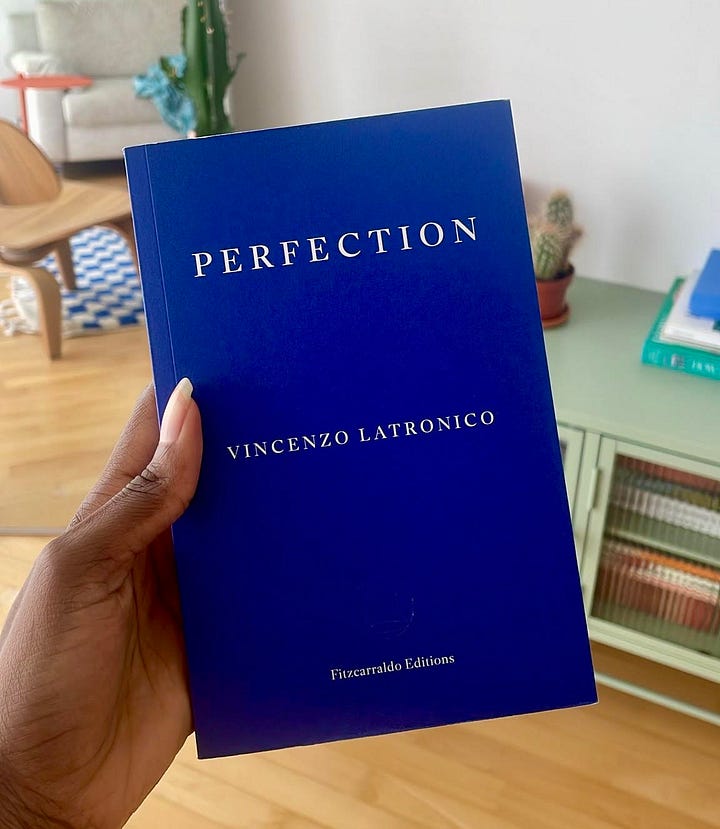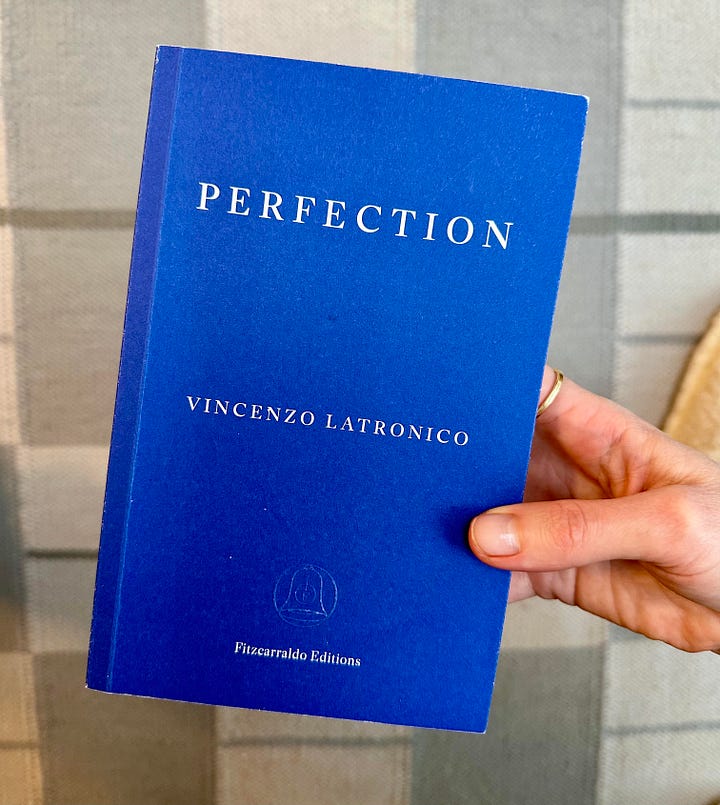Welcome to the third edition of 2 Girls 1 Book, a monthly cross-post where book whores Ochuko and Pandora chat about a new book via Google docs. This month we’re talking about Perfection by the Italian author Vincenzo Latronico - his fourth novel, but the first to be translated into English, by Sophie Hughes. As ever, we’d love to hear from you in the Comments. And for those of you who like to read along, next month we will be reading Fish Tales by Nettie Jones.
Perfection is about an Italian millennial couple, two freelance web designers named Anna and Tom, who move to Berlin to enjoy the city’s culture and party scene. They are digital nomads, drawn to ubiquitous design and cultural sameness, and forever in search of a perfectly curated life.
“Tom and Anna spent much of their first year in Berlin carefully constructing this mythology. And it wasn’t personal to them: its value lay precisely in its universality. It was a mythology shared by all the Spaniards, French, Italians and Americans they met. It was the topic of countless lifestyle articles and documentaries, and circulated on the Facebook timelines and Instagram feeds of an entire generation.”


I’m not keyed into BookTok or Bookstagram, but Ochuko you mentioned this had been all over your grid, right? Which is ironic given that the book is all about digital curation and the memeification of objects, but we will get to that.
Yes, this has been all over my Instagram feed. Mostly because it was shortlisted for the International Booker Prize and the girls I follow love a good Fitzcarraldo read. (As do I!)
It’s funny that the book is published by Fitzcarraldo as part of the small British publisher’s cult-ness, right now, is that all their books have the same blue jacket (partly because they don’t want to spend money designing book jackets that could be spent on paying the authors, but I imagine it’s also a deliberately unique design choice). And it’s a neat fit because Anna and Tom would totally want a bookcase full of Fitzcarraldo, even if they never read them.
We were actually going to read something else but once you picked this up, you messaged me saying you thought I’d be able to relate. Now that I’ve read the book, I’m not sure how to feel about that!
I’d actually only read a little when I told you that. And don’t worry, we are all complicit, that’s the point of this book for sure. I thought of you simply because a) you live in an apartment in Germany, b) you have a houseplant, and c) you have a Berber rug. Those are tenuous signifiers, but this is a book built on signifiers, so I thought it might amuse you. It’s closely inspired (I read afterwards) on George Perec’s 1965 novel, Things: A Story of The Sixties with a Man Asleep, which I have not read, but if we had, apparently what would come through is the sense of a life built on things, and what those things say about you. I think it’s the first book I have ever read with no dialogue. None! Zilch! You?
Now that you mention it, yes—this is the first book I’ve read without any dialogue. I was describing it to a friend this morning, and I said it read more like an extended essay than a book. I think the length was perfect too. It was only about 110 pages, and I’m not sure I would have enjoyed it if it were any longer. Also, I did relate to it in many ways. I saw my life and my friends' lives reflected in Anna’s and Tom’s. For context, I’m 26 and work at adidas. I moved here from the US for a job, and all my friends are young expats who moved here for work as well. I’m so ashamed to admit this, but I’ve made zero local friends in my time here (it's been 2 and a half years), and that’s actually pretty common for the circles I move in. Consequently, I speak little to no German. But I live in Nuremberg, not Berlin. Huge difference. Think New York vs. Cleveland or something.
Anna and Tom don’t speak German either. It’s interesting, I don’t know if you found this, but for a long time I couldn’t work out where they came from—thought they were British at first, with the names Anna and Tom. Then I realised they were from Italy. Do you think he deliberately does this, because he wants them to be easy to template?
Totally, I assumed they were Italian from the start simply because the author is, but I think so many of his choices in this book were meant to intentionally make the protagonists as empty as possible. Firstly, because the point is that they kind of are. But also so we can easily see ourselves—or people we know—in them. Their names, like their personalities, have no distinguishing features. Every part of themselves could have well been borrowed from a catalog.
On the dialogue note—I like dialogue. Not excessive amounts of dialogue (I actually just stopped reading a book that was too chatty) but I need some. Without any dialogue, we didn’t get to know Anna and Tom at all. That’s entirely the point, but it made the book feel hollow. Which is also entirely the point! (But not something I generally enjoy in my reading.) Anna and Tom are ciphers. They could be anyone. We have no clue what they look like, how old they are, their relationships with their family, anything at all really. But we know what they own and where they go, and their personal taste has been thoroughly homogenised by the algorithm. They are so enmeshed with tech that when they spill a coffee “their first instinct was to press command-z.” So good. So Black Mirror!
It basically is non-fiction, Pandora. I can’t say I enjoyed his book very much, but it is one I’d recommend because it’s interesting and so very relevant.
It is timely, that very 2024 word, timely.
And that phrase “personal taste.” Gosh, it’s been used to death at this point, hasn’t it? There was a period last year where everyone and their mom was publishing an essay on taste—why you don’t have it, who has it, how to get it. It was very tiresome. Like you said, it’s all homogenized by the algorithm, but the irony is that these things make them feel special and set apart. But a kind of set-apart that actually allows them to belong to a herd of people similar to them. I see it all the time here.
It’s like this feverish ennui; a kind of hectic exhaustion where you’re grinding towards nothing. I know what you mean about it feeling like non-fic too, I kept thinking about Filterworld, which is a book by New Yorker writer, Kyle Chayka, about how the algorithm has flattened popular culture. (He calls it ‘the algo’ which I am obsessed with.)
This is the most millennial sentence in the world, Pandora.
I knew you would say that. As soon as I wrote that, I thought, Ochuko is going to tell me everyone has been calling it ‘the algo’ for 5 years or something, but not in London, Ochuko, not here! (Maybe here.) I interviewed Kyle last year and he talked about this identikit global taste that he calls ‘airspace’, which started in Australian cafe culture, with the exposed industrial design and the flat whites. It’s the monstera houseplant, the berber rug (ahem), the Danish furniture, the issues of Monocle, even the salads they eat (featuring pomegranate seeds, obvs). They care more about American politics than the local politics of where they live. Even their outrage during the 2015 migration crisis— and they are genuinely outraged, they aren’t without care—is filtered through this desire to want to be seen to be caring.
And it’s very tempting to live like that. It’s socially and sometimes economically rewarding. In their case, it helped them build community in a new city. Although it was a kind of community built on very tenuous ties as we saw. I’ve experienced that as well. As someone who’s moved around a fair bit, it’s interesting and a bit disheartening to see that culture can sometimes all blend into one that way.
It’s a blessing and a curse, because Anna and Tom feel like they belong everywhere and nowhere. They never stop yearning for this idea of a life; they’re always trying to level up, it’s like the hedonic treadmill on speed. It’s something I have long been interested in: choice paradox and decision fatigue and this cultural anxiety around living the right life (which I wrote a book on in 2020.) It’s impossible, of course (there is no right life!) but that doesn’t stop so many people feeling the pressure of outside forces, the pernicious, insidious, overwhelming drive for curated sameness.
You started your career when social media was first taking off, and were very online yourself. Did you ever feel that pressure to curate your life aesthetically at any point? I know I do. My Instagram followers have probably seen my apartment more times than they’ve seen my face.
Social media went mass a few years into my career. I was working at a fashion-sharing start-up, and then a fashion columnist at a newspaper, and Instagram really worked in tandem with my job in print. I was “an enthusiastic early adopter”. Those were the golden days, because no-one really thought about whether the internet was safe or unsafe, or what your posts might mean or signify. It was joyful and thoughtless. I would say my relationship with social media changed about 8,9 years ago, when I realised that checking social media every day wasn’t good for my brain. I would say I am of the belief that pictures are by definition curated and I don’t have a problem with that—I think the warts ‘n all, shitty nappies and crying selfies can actually be it’s own type of curation—and I am definitely not impervious to trends, but I definitely knew being extremely online was not good for a brain like mine quite a while ago, and made changes accordingly. How about you?
Oh, I am adamantly offline. Notoriously offline, even—which is interesting considering my writing is largely about culture and how people behave online. But I don't see being “not online” as some huge achievement, because honestly, so what? For me, it's all about having control over its effects on you—which seems obvious, but I know a lot of people really struggle with that. Living in a smaller city has actually helped a lot. My real life feels very real and grounded, and whatever I do online (mostly talking about books) is genuinely satisfying to me.
I agree. If it works for your brain, go forth. It doesn’t appear to work hugely for Anna and Tom, though. The author describes them as feeling “like walking through the world’s most hectic street market on cocaine” when they scroll through their feeds, and yet they persist—and shape their life choices accordingly. Do you read this as a cautionary tale?
Great question. No, I read it more as an indictment of our culture. This is not what could happen to us—it’s already happening, you know?
Yes, it’s been billed as a millennial satire but I think it’s broader than that. It definitely spans Gen Z, too, although I’d say generally your generation are more cynical about THE ALGO.
Actually, Gen Z is NOT impervious to these influences. We are more aware of them, because we are frighteningly self aware, but it doesn't mean we don’t give into them. It’s kind of sad when you think about it.
Oh, that’s interesting. I mean, there isn’t much integrity to Anna and Tom’s decision-making. And that sounds meaner than I mean it to be. It is, after all, something a lot of us fall privy to, in ways big and small. Here’s an example of my own lack of integrity: despite always hating barrel jeans, I bought a pair the other day because I had read so many articles and seen so many pictures of them, I thought, I must have some. No, my original instinct/ taste was correct, I looked awful, or at least I did not look or feel like me. But I was persuaded enough to buy some!
Shame. I look great in barrel jeans. I bet you rocked a good skinny jean though.
High waist straight leg all the way, Ochuko. I found Perfection pretty funny at times. In a dry, deadpan way. “They never doubted they would grow old together. The sex was infrequent and bad.” You’re like, wait, what!? But then it transpires that they’re actually pretty happy with their sex life, they just feel like they have a bad sex life because they aren’t going to sex parties and having orgies like other people they knew in Berlin. They are not maximising their sex life and so they feel like they have failed.
This part made me laugh so hard! It's just so of the times—this deep desire to be special and edgy and different that just leads you to be exactly like everyone else, and incredibly sad and dissatisfied too. People want to be special so bad!!! But in exactly the same way.
Are Anna and Tom ever going to be satisfied, do you think? I think they slink back to Southern Italy, possibly with all their Monocles. We know they’re about to go broke, anyway. Although, wait, Anna and Tom are empty vessels aren’t they. Should I be asking, are we ever going to be satisfied…
The fact that they are so bad with money is also hilarious. They look down on their friends back home who earn less but retain more, and have families, but live “normal” and probably much more satisfied lives. The funny thing is that whenever they visit home they sell their life abroad as this amazing experience, so people envy the mirage of their lives. I think about that a lot, how we envy things and people that don't even really exist. I think satisfaction is hard to achieve because the bar is always shifting, and that's just life. We always seem to be chasing things, not enjoying what we already have, and sometimes not even building what we want but we think we should. That’s what really scares me.
Ultimately, Anna and Tom are yearning for authenticity (the holy grail of life in the C21st century!) but it eludes them time after time because they are not motivated by authentic means. I guess it’s a reminder to all of us to value an emotional life over an aesthetic one. Even though things are really fucking nice.






